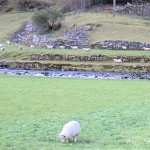by Catherine Haug
One reason why vegetarians and vegans espouse their diet is because livestock production is bad for your health and the environment.
While this is certainly true of meat from animals raised commercially in confinement pens, you do have another option: choose meats from animals raised in a natural, earth-friendly manner, and improve your health in the bargain.
See Jan 25, 2010 article in Time Magazine for a mainstream take on this subject: How Cows (Grass-Fed Only) Could Save the Planet
Or read on…
Until about 50 years ago, livestock animals were raised on family farms and ranches. Cattle and sheep grazed in pastures; chickens had free range between coop and yard; hogs were kept in spacious pens and fed scraps from the farmers’ table.
But commercial livestock production today is a totally different operation altogether. These changes began as a way to provide food to the millions who flocked to the cities in the early 1900s, but became the norm in the latter half of the 20th century when chemical fertilizers were introduced for mass-production of feed-grain crops.
Livestock are now kept in tight confinement and fed an unnatural diet (for them), primarily grains. These conditions are so inhumane, that visitors are prohibited. Check out the Food Inc, the Movie (film trailer) and the Humane Society’s websites on Factory Farming and Farm Animals.
How does modern commercial livestock production affect climate change?
Perhaps the most obvious answer is the vast amounts of animal waste all in one place. Huge amounts of methane are set free into the atmosphere as a greenhouse gas. See the OCA website for more: Killer cow emissions; Livestock Are a Leading Source of Greenhouse Gases. Why Isn’t Anyone Raising a Stink?
In addition, these animals are fed grains which require huge amounts of chemical fertilizers, pesticides and herbicides to grow. And all of these chemicals require huge amounts of fossil-fuel energy to produce. Many of them are made from petroleum.
Traditional pasture and range land are very effective at carbon sequestration, but commercial feed-grain crops are very inefficient at sequestering carbon, in large part because the chemicals used in their production inhibit the growth of soil organisms important for carbon sequestration.
Health benefit of pasture-raised meats
There are many health benefits (to humans) of meats raised naturally in pasture, and I’m sure there are some that are yet to be discovered. Here’s a short list:
- No need for constant treatment with antibiotics, because pasture-fed animals are healthy and have strong immune systems;
- Fewer stress-induced hormones in the meat;.
- Higher Omega-3: Omega-6 ratio. These are essential, polyunsaturated fats required by humans for health; each for different benefits. When animals are fed an unnatural diet of grains, their meat has an unnaturally high percentage of Omega-6 fats, and are deficient in Omega-3 fats. When fed on grass and pasture, the ratio comes into balance;
- Less saturated fat (although I would argue that saturated fat is not bad for you and does not clog arteries);
- Better taste and texture of the meat;
- Stronger bones in the animal, which makes better bone-broth (stock), higher in minerals such as calcium and magnesium that are important for human health;
- Better air in our atmosphere.
